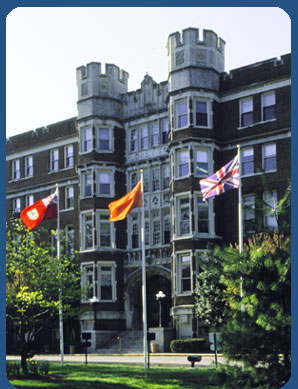| Women's Intellectual Contributions to the Study of Mind and Society Students, as part of an advanced seminar, examined and wrote about the lives of these women,
their intellectual contributions, and the unique impact and special problems that being female had
on their careers. |  |
| For information about referencing this paper - Click Here |
Clara Mayo
( 1931- 1981)
Family Background
Clara Mayo was born Clara Alexandria Weiss on September 13, 1931 in Linz , Austria. She was an only child of Joseph and Maria
Weiss. They were a close-knit family. In 1938, Clara and her parents had to relocate in another state because of Hitler and
Nazism. The family then moved to Paris where they then became refugees. In that particular time in the Weiss life they needed
anyone who could help them immigrate to the United States. Throughout that ordeal in 1939 the family finally reached the United
States by the help of others.
Education
In her early years as a child before her family moved from Austria, her parents made sure that their daughter learned how to
speak English, because she spoke German. In 1939 Clara and her family upon reaching the United States moved to New York City.
From there her parents enrolled her in public school. After elementary school, Clara attended Hunter High School where she
received good grades. Following high school, She enrolled at Cornell University in Ithaca, New York. While attending the
university, Clara became interested in philosophy. In 1952 Clara served as a research assistant, this research consisted of
detecting small behavior cues demonstrated that displayed women as being excellent at reading other peoples nonverbal cues.
Clara graduated in 1953 with a major in philosophy from Cornell University. After completing her degree, Clara got married and
took her husband‚§*s name of Mayo. At that point in time the Mayo's moved to New Hampshire. There she pursued her
Masters' degrees at Wellesley of Massachusetts. This particular degree benefited her greatly. The program featured a human
relations service and a community mental health program that she learned a great deal from.
In 1955, Clara received another Master's degree from Wellesley. Then she accepted a Social Psychology Doctoral program at
Clara University in Worchester, Massachusetts. There her dedication to psychology grew more. In 1955, she received a Ph.D.
where she wrote a dissertation on the impressions that people form from inconsistent information about others. In her
dissertation the purpose was to explore the degree to which first impressions could be altered in the face of subsequent
discrepant information.
Career Development
In 1959- 1960, Clara started out her career as social psychology trainee at the Veterans Administration Hospital in Brockton,
Massachusetts. In 1960 to 1964, she then moved to Boston, Massachusetts. There she began working as a research social
psychologist. Within this time frame she wanted to find an academic position so she could be involved in undergraduate and
graduate students. At the hospital she became a lecturer in the psychology department at Boston University in 1961. She was
also a full time professor in 1974. Also during that time she was acting director of the graduate program in the Afro- American
studies at Boston University.
Major Contributions and Achievements
Clara Mayo had many achievements throughout the years. One of her achievements was a publication entitled Toward an
Applicable Social Psychology. In her book she talked about a relevant and worthy social psychology that consisted of three
elements. Those elements reflected on improving the quality of life that was a commitment to acknowledge building and act
involvement in intervention. Furthermore in her book she explained that the social perceptions are important to study. For
example, the perceptions of one group are mostly at differences with individuals of other groups. She and her colleagues also put
emphasis on contrasting the attitudes in reference to mental illness among hospital personnel and patients including male
psychiatric patients and their wives. Mayo views are applied social Psychology and social problems were implemented stemming
from her studies. She also dedicated time to implementing different ways of conquering racism and sexism among society.
Since then Mayo continued to become active in causes she believed in society. One such cause was when she appointed to be one
of the first people to do studies among persons who were effected by racial integration in school busing. The program was called
"Operation Exodus". This study involved black families paying to bus their children to all- white schools in Boston. This research
wanted to know why black families chose this decision and what the outcome of their decisions were.
She also did research that examined nonverbal differences in how blacks and whites talked with one another. She also became in
courtroom settings because of her expertise on racial attitudes and behaviors into the courtroom. Clara did a lot for Afro
American because she believed in them and tried to understand why society acted the way they did.
Back to Women's Page